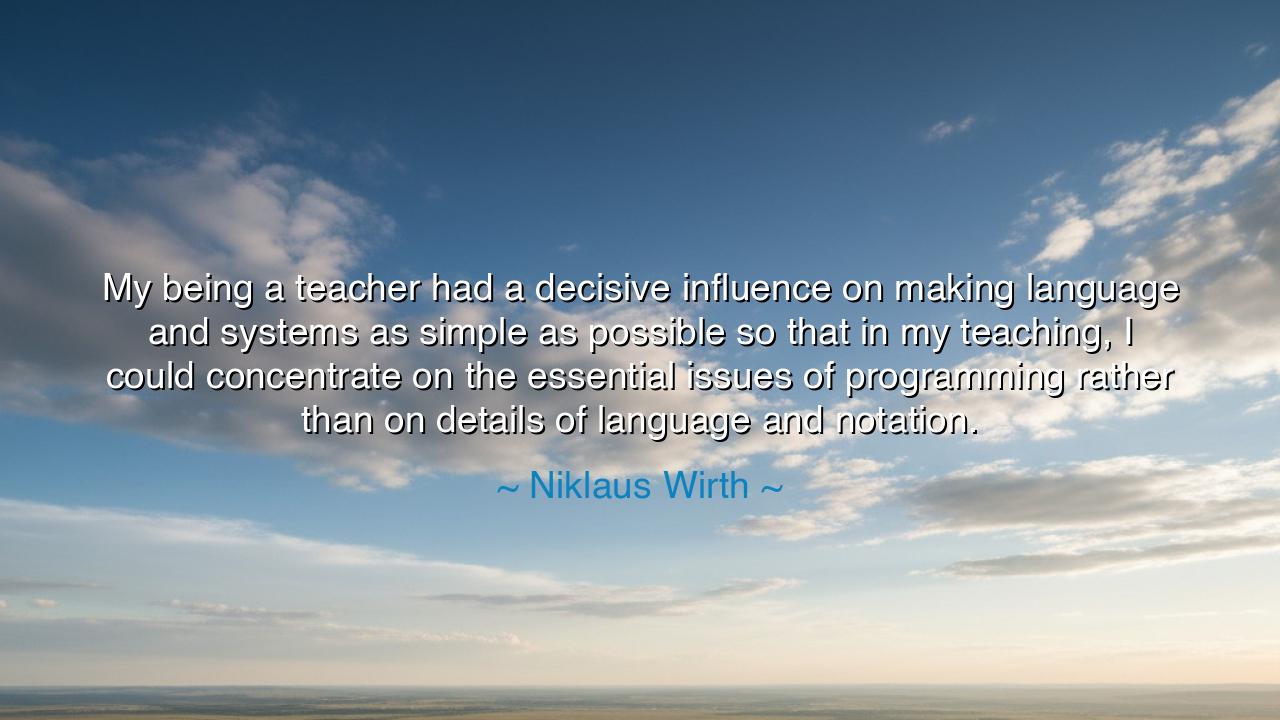
My being a teacher had a decisive influence on making language
My being a teacher had a decisive influence on making language and systems as simple as possible so that in my teaching, I could concentrate on the essential issues of programming rather than on details of language and notation.






The words of Niklaus Wirth—“My being a teacher had a decisive influence on making language and systems as simple as possible so that in my teaching, I could concentrate on the essential issues of programming rather than on details of language and notation”—carry the quiet power of wisdom born from experience. Here, Wirth reflects on how the role of teacher shapes not only the methods of instruction but also the very tools of the craft. His insight reveals that simplicity is not a limitation, but a bridge: by reducing complexity, one frees the mind to focus on the heart of the subject, the essential principles that give life to programming.
The meaning of this reflection is profound. Wirth understood that when learners are burdened by intricate rules, convoluted syntax, or cumbersome notation, the essence of the discipline becomes obscured. In teaching, clarity is a sacred duty. The teacher’s task is to remove obstacles, not to burden the student with unnecessary labyrinths. By designing programming languages and systems with simplicity in mind, Wirth allowed both himself and his students to dwell on the true essence: logic, structure, and the creation of elegant solutions. This is the eternal principle of pedagogy: simplicity illuminates, while complexity confuses.
History offers many examples of this wisdom in action. Consider Euclid, whose Elements distilled geometry into clear postulates and definitions. His work did not overwhelm with superfluous detail; instead, it built a framework so simple that generations could grasp the principles and explore the universe of shapes and theorems. Wirth’s approach mirrors Euclid’s: by designing languages that serve as vessels rather than obstacles, the learner is free to engage with the living essence of the discipline.
Another example is Richard Feynman, the physicist, who taught students not by rote memorization, but by stripping away the nonessential and revealing the core principles of nature. He emphasized understanding over formulaic repetition, demonstrating that the true measure of mastery lies in comprehension of the essentials. Similarly, Wirth’s commitment to simplicity allowed programming to become an art of thinking, rather than a laborious memorization of rules. The language itself becomes a tool for thought, not a barrier to it.
The lesson, O seekers of knowledge, is that mastery comes not from embracing complexity for its own sake, but from finding the core and letting it shine. As Wirth demonstrates, the act of teaching sharpens the mind of the teacher, compelling one to distill, refine, and reveal what is essential. In every field—whether mathematics, music, engineering, or philosophy—the clearest path to understanding is through simplicity and focus, where attention is directed to the underlying principles, not the distractions of superficial detail.
Practically, this means designing your own work, whether code, essay, or project, with clarity and economy in mind. Strip away unnecessary steps, eliminate jargon, and present ideas in a way that illuminates their essence. If you teach or mentor others, remember that your tools—the words, the systems, the methods—should serve learning, not hinder it. The simpler the framework, the more space there is for discovery, creativity, and true mastery.
Thus let it be written upon the scrolls of memory: the teacher’s insight shapes not only the learner but the craft itself. When the mind is freed from distraction, it can soar to understand the core of any subject. Niklaus Wirth reminds us that elegance and simplicity are not merely aesthetic choices—they are instruments of wisdom, allowing both teacher and student to dwell in the realm of the essential, where understanding truly resides.






AAdministratorAdministrator
Welcome, honored guests. Please leave a comment, we will respond soon